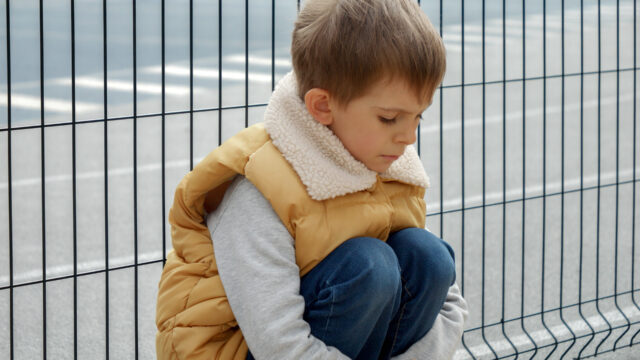Bullying doesn’t always leave visible marks, but it certainly has a long memory.

Many of the ways you move through life as an adult—how you connect, protect yourself, or shut down—can trace back to how you were treated early on. If you were treated terribly by your peers as a kid, here are some of the ways that experience might have stayed with you, even if you’ve done a lot of processing and healing in the years since.
1. You still second-guess whether people actually like you.

Even when someone is kind or consistent, a part of you wonders if they secretly find you annoying, or if they’re just being polite. You read between the lines constantly, scanning for signs that they’re losing interest or pulling away.
It’s not that you don’t want to trust them—it’s that your brain learned early on that social rejection can come out of nowhere. So now, you keep yourself in a constant state of subtle self-monitoring, just in case it happens again.
2. Compliments don’t have the effect they do on other people.

When someone compliments you, your first instinct might be to deflect, downplay, or assume they don’t really mean it. Kind words don’t feel neutral—they make you tense up a little, like you’re waiting for a punchline. This often happens when praise was once used sarcastically or to set you up for embarrassment. Now, even genuine affirmation can feel confusing. You want to believe it, but it hits the same part of you that learned to stay guarded.
3. You apologise constantly, even when you haven’t done anything wrong.

Saying sorry became a habit—something you did to keep the peace, avoid confrontation, or soften your presence before someone else tried to diminish it for you. It became a kind of emotional armour. Now, the habit sticks. You catch yourself apologising for taking up space, asking for help, or existing slightly out of sync. Even when no one’s upset, you’re still pre-emptively smoothing things over.
4. You feel like you have to earn your place in every room.

There’s this constant pressure to prove yourself—not just through your work or achievements, but through how accommodating and agreeable you are. You might find it hard to believe you belong unless you’re actively giving something. This drive usually comes from being made to feel like a burden or an outsider growing up. Now, even in safe spaces, that feeling can quietly follow you in and make it hard to fully relax.
5. You’re hypersensitive to being left out.

Even if it’s something small, like not being included in a group chat or finding out people made plans without you, the sting cuts deeper than it should. You don’t just feel excluded—you feel forgotten. The reaction isn’t about the current moment. It’s about how deeply loneliness registered when you were younger. Back then, being left out wasn’t just a moment—it was a pattern. That ache still shows up today.
6. You try to avoid standing out too much.

Getting attention doesn’t feel flattering—it feels risky. Whether it’s praise at work, a compliment on your outfit, or being called on in a group, part of you instantly wants to shrink. This reflex usually traces back to being mocked for doing something different, even if it wasn’t wrong. Now, you instinctively pull back, not because you lack confidence, but because visibility used to come with consequences.
7. You read tone and body language like your life depends on it.

You notice the smallest changes in someone’s expression or energy. You hear changes in tone that no one else even notices. You’ve trained yourself to pick up on these things so you can stay one step ahead of potential conflict. It’s a survival skill you built as a kid, constantly checking the emotional weather to protect yourself. Now, even in healthy situations, your nervous system still does that background scanning whether it needs to or not.
8. You associate love with effort instead of safety.

When you were younger, love or approval might have come inconsistently, or only when you acted a certain way. That taught you that care had to be earned, not just received. Now, you might find yourself over-performing in relationships. You give, manage, anticipate—but struggle to sit back and receive without feeling uneasy. Being loved without effort feels unfamiliar, and sometimes, even uncomfortable.
9. You struggle to hear feedback without internalising it as failure.
 Source: Unsplash
Source: Unsplash Even when someone gives you gentle, constructive feedback, it lands heavily. Your heart rate rises, your chest tightens, and you start questioning your worth, not just your work. This happens when criticism once came with cruelty or humiliation. It trained your brain to associate correction with personal attack. Now, your emotional response kicks in before your logical one even has a chance.
10. You expect people to lose interest in you eventually.

Even in secure relationships, you might brace for the moment it all fades. You keep yourself slightly distanced, just in case. That way, if someone does leave, it won’t catch you off guard. That mindset isn’t about pessimism—it’s about self-protection. When people used to turn on you with no warning, it made attachment feel unstable. Now, it’s hard to believe that something safe could actually last.
11. Loyalty feels hard to trust, even when it’s proven.

You want to believe people will stick around, but there’s always a part of you that stays on alert. You wait for the switch to flip, for the mood to change, or for the affection to disappear without explanation. Even when someone shows up consistently, you can’t help but wonder how long it will last. That lingering suspicion isn’t about them; it’s about the history your nervous system hasn’t let go of yet.
12. You downplay your achievements to avoid attention or judgement.

When you succeed at something, your first instinct might be to minimise it. You brush it off, make a joke, or quickly change the subject because celebrating yourself still feels like it could backfire. That reaction is usually tied to moments where confidence was punished or mocked. You learned that standing tall made you a target, so now, even success comes with a little shame attached.
13. You find it hard to advocate for yourself.

When someone crosses a line, you freeze. You tell yourself it’s not a big deal. You worry that speaking up will make things worse. You convince yourself to keep the peace, even if you’re quietly seething. This response often comes from a place where confrontation once ended badly. When you’ve been shut down, laughed at, or ignored before, it makes sense that sticking up for yourself now still feels high-stakes.
14. You can’t stop replaying awkward moments long after they’re over.

Something small happens—a weird joke, a comment taken the wrong way—and you think about it for hours, sometimes days. You can’t let it go, even when no one else even remembers it. That kind of mental spiralling usually comes from having your missteps turned into social ammo. You were trained to overanalyse everything to avoid being humiliated again. And now, your brain treats harmless moments like emergencies.
15. Groups still make you feel uneasy.

Even in adulthood, being in group settings can bring up old nerves. You’re aware of dynamics, inside jokes, who’s talking to who. You start scanning for signs that you’re being left out or barely tolerated. That discomfort isn’t random, you know. It’s your body remembering what it felt like to be excluded or targeted—and even though the stakes are lower now, the feelings still flare up just the same.
16. You’re deeply empathetic, sometimes to your own detriment.

Because you know what it feels like to be hurt, you go out of your way to make sure no one else feels like that around you. You listen closely, you check in, you show up. However, sometimes, that sensitivity leads to burnout. You carry other people’s pain like it’s your own, and you rarely ask for anything in return. You’re the strong one, the kind one, but underneath, you’re still healing too.




